Posted on April 30th, 2018 by Mary Lord
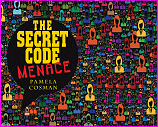 Want to get youngsters excited about computers and engineering? The Secret Code Menace, an adventure story for preteens by electrical and computer engineering professor Pamela Cosman, got 4.99 out of 5 stars from eGFI’s fourth-grade reviewer. Your STEM students will love it, too! (The author’s instructional guide includes problems and answers.)
Want to get youngsters excited about computers and engineering? The Secret Code Menace, an adventure story for preteens by electrical and computer engineering professor Pamela Cosman, got 4.99 out of 5 stars from eGFI’s fourth-grade reviewer. Your STEM students will love it, too! (The author’s instructional guide includes problems and answers.)
Read More
Filed under: Grades 6-8, Grades K-5, K-12 Education News, K-12 Outreach Programs, Special Features | Comments Off on Kid Picks: The Secret Code Menace
Tags: book review, coding, Computer Engineering, Curriculum, Electrical Engineering, forensic, Pam Cosman, Resources for Teachers, software engineering, STEM books, STEM education, The Secret Code Menace, Women in Engineering
Posted on April 30th, 2018 by Mary Lord
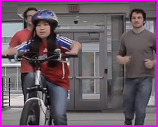 Leah Xiao-Chan O’Keefe wanted a “big kid” bike but she couldn’t shift gears or brake safely because her fingers did not extend past the first knuckle. An Ohio State University mechanical engineering professor heard Leah’s story and put two of his graduate students, both avid cyclists, on the case.
Leah Xiao-Chan O’Keefe wanted a “big kid” bike but she couldn’t shift gears or brake safely because her fingers did not extend past the first knuckle. An Ohio State University mechanical engineering professor heard Leah’s story and put two of his graduate students, both avid cyclists, on the case.
Read More
Filed under: K-12 Outreach Programs, Special Features | Comments Off on A Bike For Leah
Tags: adaptive technologies, bicycle, Design, disability, engineering technology, Ohio State University, service learning
Posted on April 30th, 2018 by Mary Lord
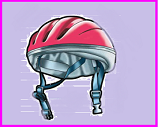 Students in grades 9 and 10 are introduced to the biomechanical characteristics of helmets and challenged to incorporate them into helmet designs. They come to understand the role of engineering associated with safety products – in this case protecting the brain and neck of a bicyclist in the event of a crash, with the design dependent on the user’s needs and specifications.
Students in grades 9 and 10 are introduced to the biomechanical characteristics of helmets and challenged to incorporate them into helmet designs. They come to understand the role of engineering associated with safety products – in this case protecting the brain and neck of a bicyclist in the event of a crash, with the design dependent on the user’s needs and specifications.
Read More
Filed under: Class Activities, Grades 9-12, Lesson Plans | Comments Off on Build a Bike Helmet
Tags: bicycle, bicycle helmet, Class Activities, EcoHelmet, Engineering Design Process, force and motion, Grades 9-12, Lesson Plan, Materials Engineering, NHTSA, Physics, Safety engineering, Sports, video
Posted on April 20th, 2018 by Mary Lord
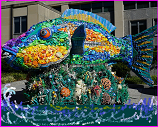 Clean a beach, create art, or help monitor marine debris as a citizen scientist. Check out these lesson plans and other resources for celebrating World Oceans Day June 8.
Clean a beach, create art, or help monitor marine debris as a citizen scientist. Check out these lesson plans and other resources for celebrating World Oceans Day June 8.
Read More
Filed under: For Teachers, Lesson Plans, Special Features, Web Resources | Comments Off on Tackle Plastics for World Oceans Day
Tags: Citizen Science, Competitions for Students, Environmental Engineering, Internet Resources, marine debris, marine debris monitoring and assessment project, Marine Debris Program art contest, NOAA, ocean plastic, Teacher Resources, University of Georgia college of engineering, washedaway.org, Web Resources, world oceans day
Posted on April 18th, 2018 by Mary Lord
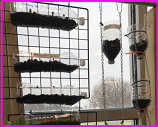 Students in grades 6 to 8 explore food production problems related to population growth and then engineer a model vertical farm as a potential solution in a fictional community, Greentown, culminating with a presentation to the imaginary city’s “legislators.”
Students in grades 6 to 8 explore food production problems related to population growth and then engineer a model vertical farm as a potential solution in a fictional community, Greentown, culminating with a presentation to the imaginary city’s “legislators.”
Read More
Filed under: Class Activities, Grades 6-8, K-12 Outreach Programs, Lesson Plans, Web Resources | Comments Off on Engineer a Vertical Farm
Tags: agriculture, Class Activities, crops, EiE, Engineering Design Process, engineering grand challenges, Engineering is Elementary, Engineering is Everywhere, Environmental Engineering, Environmental science, food supply, Grades 6-8, greenhouse, plant science, school gardens, STEM education, vertical farming, Web Resources
Posted on April 6th, 2018 by Mary Lord
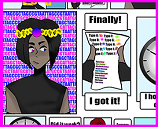 What does a solar-powered, high-flying hero named Heliora have in common with a peppy polymer that transforms into a cell-size, chain-welding warrior to battle an antibiotic-resistant superbug? Both won the 2018 Generation Nano challenge!
What does a solar-powered, high-flying hero named Heliora have in common with a peppy polymer that transforms into a cell-size, chain-welding warrior to battle an antibiotic-resistant superbug? Both won the 2018 Generation Nano challenge!
Read More
Filed under: K-12 Education News, K-12 Outreach Programs, Special Features | Comments Off on Generation Nano Superhero Winners
Tags: comic books, Competitions for Students, Contest, Generation Nano, Nanotechnology, National Science Foundation, NSF, STEM education, STEM superheroes, Web Resources
Posted on April 6th, 2018 by Mary Lord
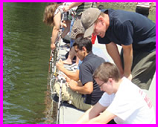 Sensors are in everything from smart phones to corn fields. They also can be a powerful and engaging tool to teach STEM. SENSE IT, a free, research-based curriculum, involves students in hands-on learning about their local environment by constructing, deploying, and interpreting data from a network of water-quality sensors.
Sensors are in everything from smart phones to corn fields. They also can be a powerful and engaging tool to teach STEM. SENSE IT, a free, research-based curriculum, involves students in hands-on learning about their local environment by constructing, deploying, and interpreting data from a network of water-quality sensors.
Read More
Filed under: Grades 6-8, Grades 9-12, K-12 Outreach Programs, Lesson Plans, Web Resources | Comments Off on Sense It!
Tags: circuits, Curriculum, data analysis, Environmental Engineering, Environmental science, Grades 6-8, Grades 9-12, integrated STEM, Internet Resources, iSTEM, Lesson Plan, Liesl Hotaling, SENSE IT, sensors, Teacher Resources, water quality, Web Resources
Posted on April 6th, 2018 by Mary Lord
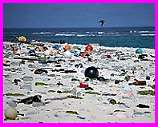 Students learn about the Great Pacific garbage patch, research the extent and impact of plastics pollution on oceans, and present that information as a short, eye-catching newsletter suitable to hand out to fast-food restaurant customers.
Students learn about the Great Pacific garbage patch, research the extent and impact of plastics pollution on oceans, and present that information as a short, eye-catching newsletter suitable to hand out to fast-food restaurant customers.
Read More
Filed under: Class Activities, Grades 6-8, Lesson Plans | Comments Off on Ahoy! Plastic in the Ocean
Tags: Class Activities, Common Core State Standards, data analysis, ecosystem, Environmental Engineering, environmental stewardship, GIS, Grades 6-8, graphic design, great ocean garbage dump, Lesson Plan, literacy, Mapping, Marine Science, Pollution, Research, STEAM, Videos, water cycle, writing
Posted on March 15th, 2018 by Mary Lord
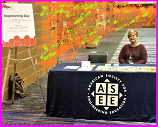 Couldn’t make it to ASEE’s Engineering Day at the 2017 National Science Teachers Association regional conferences or annual STEM Forum? Check out these hands-on highlights – and join us at the NSTA STEM Forum in Philadelphia July 11-13, 2018!
Couldn’t make it to ASEE’s Engineering Day at the 2017 National Science Teachers Association regional conferences or annual STEM Forum? Check out these hands-on highlights – and join us at the NSTA STEM Forum in Philadelphia July 11-13, 2018!
Read More
Filed under: K-12 Outreach Programs, Special Features, Web Resources | Comments Off on ASEE Engineering Day Highlights
Tags: American Society for Engineering Education K-12, ASEE, assessment design, Class Activities, Design, Energy, force and motion, Harpeth Hall School, Liesl Hotaling, NGSS, NSTA, penguins, polar ice, polar research, Resources for Teachers, sensors, STEM education, STEM NOLA, Web Resources
 Want to get youngsters excited about computers and engineering? The Secret Code Menace, an adventure story for preteens by electrical and computer engineering professor Pamela Cosman, got 4.99 out of 5 stars from eGFI’s fourth-grade reviewer. Your STEM students will love it, too! (The author’s instructional guide includes problems and answers.)
Want to get youngsters excited about computers and engineering? The Secret Code Menace, an adventure story for preteens by electrical and computer engineering professor Pamela Cosman, got 4.99 out of 5 stars from eGFI’s fourth-grade reviewer. Your STEM students will love it, too! (The author’s instructional guide includes problems and answers.)








 Leah Xiao-Chan O’Keefe wanted a “big kid” bike but she couldn’t shift gears or brake safely because her fingers did not extend past the first knuckle. An Ohio State University mechanical engineering professor heard Leah’s story and put two of his graduate students, both avid cyclists, on the case.
Leah Xiao-Chan O’Keefe wanted a “big kid” bike but she couldn’t shift gears or brake safely because her fingers did not extend past the first knuckle. An Ohio State University mechanical engineering professor heard Leah’s story and put two of his graduate students, both avid cyclists, on the case.  Students in grades 9 and 10 are introduced to the biomechanical characteristics of helmets and challenged to incorporate them into helmet designs. They come to understand the role of engineering associated with safety products – in this case protecting the brain and neck of a bicyclist in the event of a crash, with the design dependent on the user’s needs and specifications.
Students in grades 9 and 10 are introduced to the biomechanical characteristics of helmets and challenged to incorporate them into helmet designs. They come to understand the role of engineering associated with safety products – in this case protecting the brain and neck of a bicyclist in the event of a crash, with the design dependent on the user’s needs and specifications. Clean a beach, create art, or help monitor marine debris as a citizen scientist. Check out these lesson plans and other resources for celebrating World Oceans Day June 8.
Clean a beach, create art, or help monitor marine debris as a citizen scientist. Check out these lesson plans and other resources for celebrating World Oceans Day June 8. Students in grades 6 to 8 explore food production problems related to population growth and then engineer a model vertical farm as a potential solution in a fictional community, Greentown, culminating with a presentation to the imaginary city’s “legislators.”
Students in grades 6 to 8 explore food production problems related to population growth and then engineer a model vertical farm as a potential solution in a fictional community, Greentown, culminating with a presentation to the imaginary city’s “legislators.”  What does a solar-powered, high-flying hero named Heliora have in common with a peppy polymer that transforms into a cell-size, chain-welding warrior to battle an antibiotic-resistant superbug? Both won the 2018 Generation Nano challenge!
What does a solar-powered, high-flying hero named Heliora have in common with a peppy polymer that transforms into a cell-size, chain-welding warrior to battle an antibiotic-resistant superbug? Both won the 2018 Generation Nano challenge! Sensors are in everything from smart phones to corn fields. They also can be a powerful and engaging tool to teach STEM. SENSE IT, a free, research-based curriculum, involves students in hands-on learning about their local environment by constructing, deploying, and interpreting data from a network of water-quality sensors.
Sensors are in everything from smart phones to corn fields. They also can be a powerful and engaging tool to teach STEM. SENSE IT, a free, research-based curriculum, involves students in hands-on learning about their local environment by constructing, deploying, and interpreting data from a network of water-quality sensors.  Students learn about the Great Pacific garbage patch, research the extent and impact of plastics pollution on oceans, and present that information as a short, eye-catching newsletter suitable to hand out to fast-food restaurant customers.
Students learn about the Great Pacific garbage patch, research the extent and impact of plastics pollution on oceans, and present that information as a short, eye-catching newsletter suitable to hand out to fast-food restaurant customers.  Couldn’t make it to ASEE’s Engineering Day at the 2017 National Science Teachers Association regional conferences or annual STEM Forum? Check out these hands-on highlights – and join us at the NSTA STEM Forum in Philadelphia July 11-13, 2018!
Couldn’t make it to ASEE’s Engineering Day at the 2017 National Science Teachers Association regional conferences or annual STEM Forum? Check out these hands-on highlights – and join us at the NSTA STEM Forum in Philadelphia July 11-13, 2018!